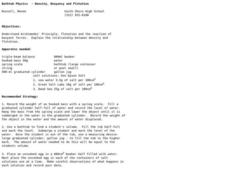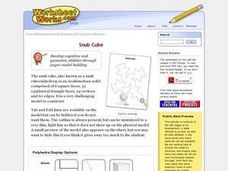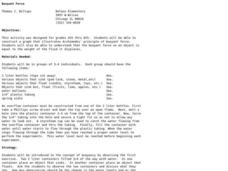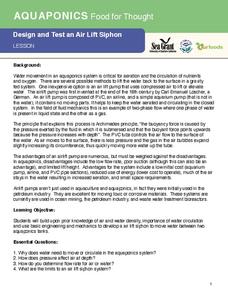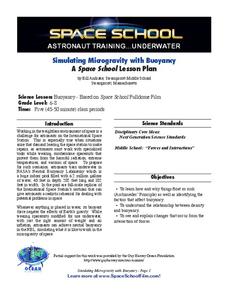NOAA
Boat Building Challenge
Scholars build a boat using an assortment of materials such as foam plates, aluminum foil, and skewers, then test its buoyancy with pennies. Challenge boat builders to construct the strongest or fastest boat in a healthy competition with...
CK-12 Foundation
Going Fishing
Why do some things float and others sink? A creative simulation allows learners to adjust mass and volume of an object to affect its buoyancy in water. A graph records the effect of each manipulation.
CK-12 Foundation
Scuba Training
How does a scuba diver control whether they sink or float? Scholars observe the relationship between absolute pressure and depth below the surface in an undersea simulation. They control the diver size and depth to center of mass to see...
Curated OER
More Than Meets the Eye
Students use the Archimedes method to demonstrate scientific principles behind observations.
Curated OER
Experiment: Refraction And The Reappearing Coin
In this refraction worksheet, students perform an experiment by putting a penny in a bowl, walking off and turning back around to see if they can still see the penny or not.
Curated OER
Float Your Boat
Students investigate buoyancy, displacement and density. In this flotation activity students study the Archimedes' Principle, analyze data and draw conclusions.
Curated OER
Bathtub Physics - Density, Buoyancy and Flotation
Learners study Archimedes' Principle, flotation and the reaction of buoyant forces and explain the relationship between density and flotation.
Curated OER
Snub Cube
In this math activity, middle schoolers create a paper model of a snub cube. It is an Archimedean solid comprised of 6 square faces, 32 equilateral triangle faces, 24 vertices and 60 edges.
Curated OER
Rombicosidodecahedron
In this math worksheet, students create a geometric paper model of a rombicosidodecahedron solid that is considered a challenging project.
Curated OER
Buoyant Force
Students illustrate Archimedes' Principle of Buoyant Force. In this graphing lesson, students will observe that the buoyant force on an object is equal to the weight of the fluid it displaces. Students will then create a graph showing...
Curated OER
Density-Qualitative and Quantitative
Students investigate density using film canisters filled with different density materials and larger objects of varying density. In this density lesson plan, students discuss the concept of density and rank film containers from dense to...
National Sailing Hall of Fame
How a Sailboat Works: Hull Speed and Buoyancy
How can you determine the maximum speed of a sailboat? A sailing presentation included with a straightforward lesson plan prompts learners to calculate the maximum speed of a sailboat with a displacement hull. The presentation continues...
Curated OER
Ice Floats
Learners explore the changing density of water. In this physics lesson, students investigate how an object's density determines whether it will float or sink in water. They explain why this unique property of is important to living things.
Cornell University
Buoyancy
Swimmers know to float by turning their bodies horizontally rather than vertically, but why does that make a difference? In an interesting instructional activity, scholars explore buoyancy and the properties of air and water. They test...
University of Southern California
Design and Test an Air Lift Siphon
Build an air lift siphon using your mad physics skills! Learners first investigate the importance of circulating water in aquaponics systems. They then use density to their advantage as they engineer an air lift siphon
Florida International University
Simulating Microgravity with Buoyancy
How do astronauts know how to live and work in a weightless environment? It doesn't come naturally! Junior physicists conduct experiments to examine the link between buoyancy and microgravity. Each activity illustrates a different aspect...
Curated OER
I've Got That Sinking Feeling
Students design a simple boat and predict how much weight it can carry. They should also discover why objects float or sink and how this can be determined experimentally. A great lesson on buoyancy!
Curated OER
Density Challenge
Students calculate the densities of several liquids that appear similar. In this physical science lesson, students go beyond understanding the way liquids of different densities behave to researching how this knowledge applies in real...
Curated OER
Buoyant Boats
Students design and construct a boat out of aluminum foil and a few other simple materials. The boats then be tested by floating them in water, then adding mass until they sink. They explore the various shapes of boat construction.
Space Awareness
The Big Meltdown
Explore the world (our world) of melting ice caps. Why are these caps melting? What is the effect of melting ice caps? Dive into the ever-present issue of global warming with a resource that has learners looking at data and participating...
Curated OER
Energy and Matter
A review of a full unit on energy and matter, this slide show starts with basic definitions of states of matter and their mass. It then develops the ideas of the forces that that matter can exert. Details about bonding within matter and...
Curated OER
Dive In
Students study how buoyancy, pressure, and light can effect the work of underwater scientists. In this marine science lesson students complete a lab that allows them to better understand how pressure varies with altitude and depth.
Curated OER
Density in Relation to Float and Sink
Students explore the concept of density. In this density activity, students determine the density of various objects. Students use the density of the various objects to predict the density of various unknown solutions.
Curated OER
Helium Balloon Race
Students determine the force of a helium balloon that allows it to rise a specific distance. For this helium lesson students calculate the amount of paper needed to construct a weight and determine the density of a piece of paper.
Other popular searches
- Archimedes Principle Videos
- Archimedes Principle Poem
- Archimedes Principle Inquiry
- Physics Archimedes Principle
- What Archimedes Principle
- Archimedes' Principle Mc
- Archimedes' Principle Mcq








